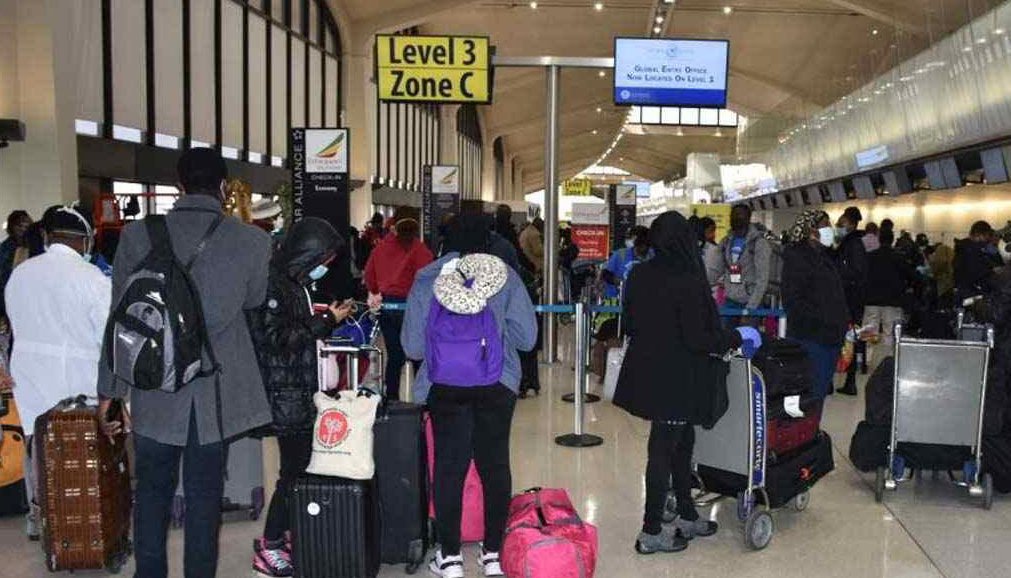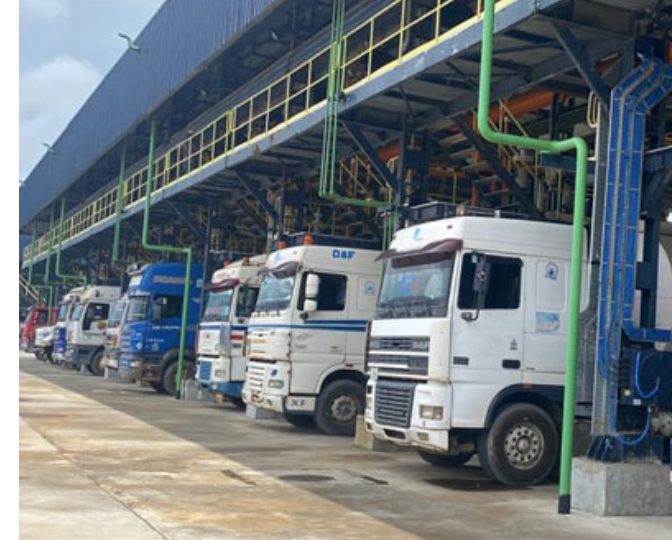
At the new RoE, uniformly used by the Global Distribution Systems (GDSs) of airlines, a six-hour Lagos-London Economy class ticket now ranges between N1.1 million to N4.2 million – subject to airline of choice, place, time of booking, and availability. Its Business class variant sells for between N3 million and N12 million.
While the rich may have very little complaint, the middle class that are near dependent on air travel are exploring options of booking Nigerian flight tickets either from neighbouring African countries, Europe or America.
Aviation stakeholders confirmed that the bypass of the high-end local market explains the full capacity of international flights departing from Lagos and Abuja, despite high inflation and low patronage in the Nigerian market.
However, the consequence is dire erosion of the air travel market for local travel agencies, accruable taxes and charges’ earnings, and attendant loss to the economy.
Summer travel: Embargoed!
Following the reopening of Mainland China from self-imposed lockdown and World Health Organisation (WHO) lifting all COVID-19 restrictions, international air transport has gone full throttle again, with this year’s summer travel looking up.
In North America for instance, 63 per cent of U.S. adults plan to travel this summer, up from 61 per cent of this time last year, according to a recent survey by Bankrate, a consumer-finance data provider.
In another survey, a resounding 87 per cent of survey respondents expect to travel at least as much as they did in the prior year, with 49 per cent selecting that they expect to travel more.
This is especially true among younger respondents, with 59 per cent of those between the ages of 18 to 26 planning to travel more in 2023. This is impressive considering 45 per cent of respondents travelled once or twice in 2022, with 42 per cent traveling three or more times in 2022.
Over half of respondents plan to take leisure trips to see loved ones. Road trips, beach vacations and trips to celebrate life events or milestones such as a birthday or anniversary were also popular vacation options. Airlines are also bracing for this high demand, and aviation authorities are warning of another season of chaotic flight disruptions.
Notably, the high expectations in the U.S. come as inflation eased to 4.9 per cent in April after having peaked at 9.1 per cent last June and as the Biden administration’s ending of the pandemic emergency officially concludes the era of COVID-related travel restrictions, which have largely evaporated anyhow.
But in Nigeria, the inflation trend is far wayward and summer getaway now the least priority for erstwhile ‘happiest people on earth’. Many vacationers are shelving their getaway plans over a nervy price range coming from vendors.
A Lagos-based systems engineer, Afeez Abdullahi, is one of those that would not be observing summer vacation in Europe this year. Abdullahi told The Guardian that his family of six gave up the plan on receiving the estimated bill of N15.2 million for airfare alone.
“This is the second year of no (London) holiday trip for my family. While there is life, there is hope,” he said in self-consolation.
“Besides affordability, I just personally felt it was crazy to pay that much (minus other expenses) for a two-week vacation that has always been a ritual anyway. The total cost is about N20 million. It is not worth it. Instead, we will visit some states at a low budget. That is the best this period can afford,” Abdullahi said.
 Another holiday prospect, Adeyemi, last travelled in 2021 and at a price of N650,000 for an Economy Class seat.
Another holiday prospect, Adeyemi, last travelled in 2021 and at a price of N650,000 for an Economy Class seat.
Now, he has the same nine-hour flight ticket for N3.8 million and a cumulative of N22.8 million for the family! He has aborted the holiday trip completely.
“Something very strange must be going on in the aviation sector in Nigeria,” he told The Guardian.
A crisis or windfall?
It will be recalled that the international segment of the aviation sector has been in airlines’ stuck fund crisis in the last two years. It came with knock-on effects on inventories, the asking price, and near-collapse of local travel agencies.
Earlier intervention by the Central Bank of Nigeria (CBN) did pledge $265 million in August 2022, leaving a balance of $200 million of the stuck fund in Nigeria. But the stranded funds kept piling by daily sales of tickets, to warrant Emirates Airlines quitting the Nigerian route late October 2022. As at the last check, industry sources said the accumulated was well over $800 million.
The Guardian learnt that following a negotiation to end the lock jam, the authorities recently conceded a shift from the official CBN window to the much volatile I&E window for the repatriation of foreign airlines funds in Nigeria.
The push-pull effect has been evident in the applicable rate of exchange, and attendant cost of travel. At this time in May 2023, the RoE was pegged at N462 to a dollar. About a week later, the rate climbed to N500/$1. Some days afterwards, it reached N551.
By June, the high vicissitude window hit a new high of N582/$1, with airfares tagging along. The Federal Government’s recent resolve to have a unitary FX window further caused the airlines’ RoE to be adjusted to N795.28/$ as at last week.
Inquiries by The Guardian showed a varying price range across international carriers on the Nigerian route. Except for some African and Middle East carriers that offer relatively affordable rates, the European and American airlines are way beyond average means.
For instance, a Lagos-London-Lagos Economy Class return-ticket seat on Qatar (with stopover in Doha) that cost an average of N1.2 million in May has, as at last weekend, shifted to an average of N1.8 million. Its business class that was sold for N4.8 million in May, now ranges between N3.6m and N5m.
The flagship African carrier, Ethiopia (via Addis Ababa), offered the two cabins for N1.1 million and N3.36 million, respectively in May. This week, where seats are available, the economy return-ticket cost between N1.3m and N4.2m (in “assorted” class). Its Business class was between N2.4m and N13.6m (“assorted”).
Legacy carriers like British Airways (BA) and Virgin Atlantic (VA) are on the higher side. Direct Lagos-London-Lagos flight ticket on BA costs an average of N1.8 million in Economy cabin, and N4.41 million for Business class travellers as of May. This week, BA costs over N2.5 million for Economy and N9 million for Business class, when The Guardian inquired.
 Apparently concerned by the record-high pricing regime, the International Air Transport Association (IATA) pushed back the blame for the high fares.
Apparently concerned by the record-high pricing regime, the International Air Transport Association (IATA) pushed back the blame for the high fares.
The global clearing house for over 290 world airlines noted that the exchange rate applied to international flight tickets sold in Nigeria are not determined by IATA, and incorrect to describe them as the “IATA exchange rate”.
“Air fares for international flights from Nigeria are denominated in U.S. Dollars and converted into Naira, the local currency, for sale in the Nigerian market. These conversions use the official prevailing exchange rate provided by the country’s financial system.
“IATA simply applies the spot rate at which the Central Bank of Nigeria sells USD through banks to the market, at its fortnightly retail foreign exchange auctions. The rate is not static, i.e. if the rate at which the CBN sells USD goes up, the exchange rate applied to airfares will follow and vice versa,” IATA stated.
Market erosion, revenue loss
Stakeholders acknowledged the inherent respite on foreign airlines that are patronising the Investors and Exporters (I&E) FX window for fund repatriation – a development that has significantly doused the stuck fund row lately.
But the dire consequences of the attendant spike in the cost of airfares are the ‘exploitation’ of the consuming public and its sweeping effect on the market generally.
President of the National Association of Nigerian Travel Agencies (NANTA), Susan Akporiaye, said the new dispensation in fare pricing is partly solving the problem of stuck funds, but has created a new one.
Akporiaye told The Guardian that international travel sales in the country declined by about 40 per cent, with only six in every 10 Nigerian flights now purchased locally.
She said notwithstanding the economic crunch and expensive airfares, “people are still travelling from Nigeria”, with tickets bought from neighbouring countries and abroad.
“Airfares are ridiculously high and far beyond the pay grade of most Nigerians. But that said, international flights are still departing with full cabins. It tells us that people are still travelling, and the majority are going to alternative destinations.
“Before now, Europe and North America used to be the prime destination for many families going on vacation. That is beginning to change, with people travelling to African countries and the Middle East for holidays. To complement this is the (comparatively) affordable airfares that are coming from the African carriers. So, people are still travelling, though to alternative destinations.”
She added that air travellers are also finding alternative routes to cheaper tickets, but from outside Nigerian shores.
“Because we are selling only the highest fares here, the sales of Nigerian flights are now going to neighbouring countries (that have lower inventories and affordable fares). Passengers are travelling to Accra, Lome, Cotonu to catch international flights.
“There are many that are still travelling from Nigeria, but they are having their tickets purchased from London, U.S. and Canada. That is why flights originating from Nigeria are still full. You cannot blame them where tickets that go for $4000 to $6000 in Nigeria are available for $2000 in America. That is a sad story,” Akporiaye said.
She said further that in that circumstance, a lot of travel agencies have closed shops as the travel business is taking a plunge despite the peak of the summer season.
Apparently in agreement with Akporiaye, Chairman of the Airlines and Passengers Joint Committee (APJC) of the International Air Transport Association (IATA), Bankole Bernard, said Nigerians are by nature bound to travel – beg, borrow, or steal.
Bernard said in the hierarchy of needs – after food, cloth and shelter needs are met – mobility is the next.
“With the hike in ticket prices, Nigerians will still travel because nobody wants to go low in standard. Even if it requires pulling out the savings, travel is still a must for most clients.
“The Naira devaluation is not helping anyone. Tickets of $1000 that used to cost about N400, 000 are now over N800, 000 and beyond. Because the people are meant for mobility, the airlines are making a lot of money and recouping from the industry,” he said.
Bernard, who is also the Group Managing Director of Finchglow Holding, reiterated that the stuck fund crisis had regrettably dragged on for too long because the government was indecisive on what to do with the FX liquidity crisis, and its effects on the foreign airlines.
“The government has been neither here nor there. If you are telling the airlines not to sell at NAFEX rate, but in Naira, and they are not getting their equivalence for repatriation, then the government is the creator of the problem.
“But the airline has started getting their money because they are not waiting for the CBN anymore. They are on I&E window, though it is higher, but it is good for the airlines, and even the government.
“When you do not subsidise airfares, the airlines will become commercially lucrative because they can sell at the RoE and repatriate their monies easily. Instead of doing one flight, they can do three trips, and make more money. In transport, the real income comes from volume and not yield.
“The only people that are suffering in all of this are the masses. Unfortunately, it is our people that are being exploited and suffering through the very expensive airfares. It is a sad and painful development,” Bernard said.
Where is Air Peace, local capacity for int.l routes?
Besides, the growing rate of seeking affordable airfares is eating deep into revenue of both the industry and economy at large, and a reason for regulators to be worried.
Bankole said: “The Nigeria Civil Aviation Authority (NCAA) statutorily earns five per cent charges for every ticket sold in Nigeria. For several months now, most of the tickets Nigerians use are bought from other countries, which means we are losing revenue. So, how come nobody is bothered despite the heavy loss in revenue compared to the previous year? There is a problem. It means that they have not been relying on that revenue stream.
“The airlines have just been coming here to exploit us and we are not complaining. It will surely get to the point of selling in dollars. The planes are getting filled up because even travel agencies are partnering with their counterparts abroad, to buy and sell tickets for Nigerians and remain in business. It is a crazy situation, but what choice are people left with?” Bernard queried.
Secretary of the Aviation Safety Round Table Initiative (ASRTI), Olumide Ohunayo, reckoned that the solution to the high pricing regime is to build local capacity for fair competition.
Ohunayo explained that the upward adjustment in RoE is not the exclusive preserve of foreign airlines. Rather, it is based on agreement with the CBN, and notification of the Civil Aviation Authority.
“Before now, and due to accumulation of funds, the airlines have been selling only premiums to cushion the effect of the trapped funds. Now that they have increased the RoE through I&E window, I think we are gradually getting to the solution.

Foreign Airlines
“Really, the fare going up is inevitable, and that is the situation we have found ourselves in. We only need to compete, and throw more capacities into the international segment. It is either you encourage Nigerian airlines to participate or increase frequencies of foreign airlines.
“I want to see Nigerian airlines participating in the foreign segment. I am seeing local airlines (Air Peace) going to India, Israel, but what is happening to the core routes like London, Ireland, U.S.? We must throw in the capacity to bring down prices.
“There is a continued increase in airfares because of heavy demand pull on those routes that is not being matched with capacity. It is sad that a popular route like Lagos-London, with 21 frequencies already used to the maximum by two British carriers, still has nothing from the Nigerian operators in eight years! That is a big shame. If we cannot have a Nigerian scheduled airline operate on that route, why not designate a chartered airline to represent Nigerian interest on the London route?” he queried.
Ohunayo, who is the Head Research & Corporate Travel at Zenith Travels, said Nigeria should begin to designate airlines on international routes, with the regulators and Ministries of Foreign Affairs and Aviation ensuring that they become commercial success.
“An air
line must not be government-owned before it gets protection. Virgin Atlantic is globally protected by the British government on issues that have to do with international trade. You dare not tough U.S. airlines anywhere. The government is right behind them and ready to retaliate immediately. That is how it is done. Nigeria did support Air Peace on the Dubai route, but only after the damage had been done.
“The demand is still there to travel because we as Nigerians travel for everything, including wedding, naming ceremony, birthdays and so on; we are always there. But the new government has to change focus in handling the aviation sector. We should throw capacities to bring down the airfares and stop giving our markets away to other economies.
“The biggest beneficiaries of our lack of capacity are the likes of RwandAir, Royal Air Maroc, Turkish Airlines, Ethiopia Airlines and others that are making a clean sweep. Because of the increase in airfares, they have also jack up their tickets. I don’t blame them, because they are in business to make profit, not to sympathise with your economy or RoE. Qatar Air has just declared a profit of $1 billion. Where else do they have as many frequencies and gauge as they have in Nigeria? So, we must also throw in capacity on European routes to beat down the fares. If Air Peace operates those routes at N700, 000, you will see that all other airlines will drop their fares,” Ohunayo said.




